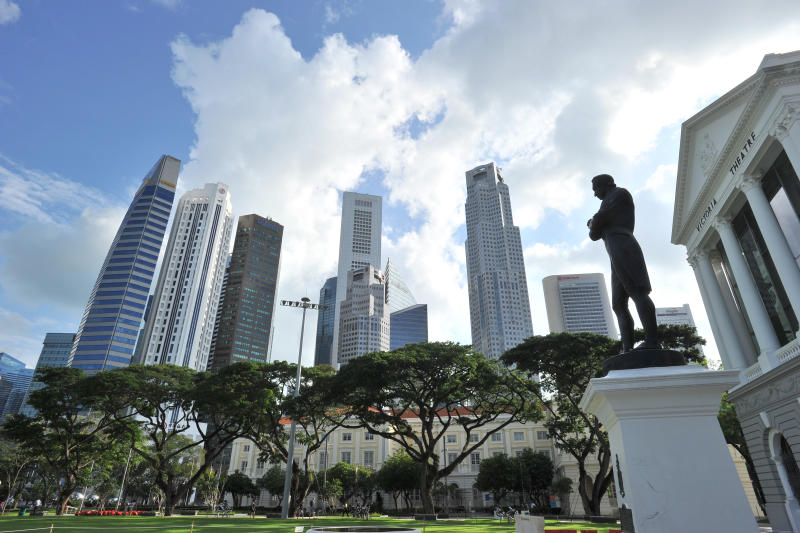Plans to mark 200th anniversary of the founding of modern Singapore in 2019: PM Lee
Sign up now: Get ST's newsletters delivered to your inbox

Prime Minister Lee Hsien Loong noted in his new year day message that Singapore became a British colony, a free port, and a modern city because of Stamford Raffles.
PHOTO: ST FILE
Yuen Sin
Follow topic:
SINGAPORE - The Singapore story did not begin in 1965, the year of independence. Instead, it stretches back 700 years, telling a tale of ebb and flow.
One major turning point was in 1819 when Stamford Raffles landed here, setting the island on a different trajectory, noted Prime Minister Lee Hsien Loong in his new year day message on Sunday (Dec 31).
"Because of Raffles, Singapore became a British colony, a free port, and a modern city," he said.
He announced plans for Singapore to mark the 200th anniversary of 1819, calling on Singaporeans to "understand truly how far back our history reaches, and how complex it is".
Even before Raffles' arrival at St John's Island on Jan 28 that year, Singapore had a rich history, harking back to the 14th century when it was a maritime emporium. Migrants from China, India and other regions later formed families and communities, "turning an emporium into a home, and eventually a country".
While the SG50 celebrations in 2015 had paid tribute to the Pioneer Generation, there are groups older than independent Singapore which have contributed to its foundations, added PM Lee.
He cited anniversary celebrations he attended in recent months: the 100th anniversaries of the Singapore Malayalee Association, Masjid Khalid and his alma mater Nanyang Girls' High School, and the 150th anniversary of Thong Chai Medical Institution. "Each has contributed to the Singapore Story... Without this history, we could not have made the SG50 journey from third world to first," PM Lee added.
The bicentennial commemoration will debunk the conventional narrative that Singapore had been only a backward fishing village before its transformation into a developed country today, say historians.
Organisers of the commemorative activities also said that the commemoration will not take on a "rose-tinted, celebratory" sheen or perpetuate a great man narrative of history since the arrival of colonial powers on the island.
Instead, it will be a reflective attempt to understand the "full essence and complexity" of events in Singapore's 700-year long history, Yale-NUS College president Tan Tai Yong, who sits on the Singapore Bicentennial advisory panel, said at a press briefing last week.
The bicentennial, which wants to be "responsible to history", will not shy away from addressing elements in history that may not be always positive, added Mr Gene Tan, executive director of the newly-created Singapore Bicentennial Office in the Prime Minister's Office.
This includes acknowledging the "squalor and segregation" that existed under colonial rule, and the 1915 Sepoy Mutiny, which saw over 400 Indian soldiers rise against the British during World War I.
Plans for the bicentennial will be overseen by Minister for Social and Family Development Desmond Lee and Minister in the Prime Minister's Office Josephine Teo, with Finance Minister Heng Swee Keat advising.
The bicentennial will pay homage to ground-up organisations that reflect the "organic effervescence" of the story of how Singapore came to be. To that end, the office will engage them throughout 2018, to plan for how stories of various groups' historical roles can be told.
The PMO declined to disclose its budget for the bicentennial activities but said it will be on a smaller scale than SG50.
Prof Tan Tai Yong said the commemorative activities will reflect evidence of Singapore's long history that could even pre-date the 14th century. This runs counter to popular belief that "Raffles landed in Singapore, founded modern Singapore and (it was only then that) our history started".
It is important to debunk the notion that Singapore had existed merely as a sleepy fishing village before Raffles arrived, said Mr Yatiman Yusof, Singapore's non-resident High Commissioner to Kenya, who is also on the bicentennial advisory panel.
"Singapore was a well-known trading centre (in the centuries before that), and Raffles' arrival propelled it into a more energetic and attractive place for business," he added.

